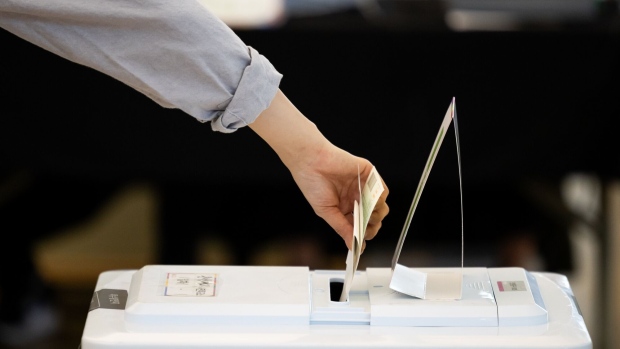Apr 18, 2024
UK Spurs Intelligence Sharing With Allies on Vote Manipulation
, Bloomberg News

(Bloomberg) -- The UK is spearheading a drive to expand intelligence-sharing on electoral interference beyond its Group of Seven allies, as a large swath of the globe heads to the polls in national elections this year, people familiar with the matter said.
Prime Minister Rishi Sunak’s administration has been pushing G-7 nations and other European allies to boost the exchange of information between their intelligence agencies on attempts by hostile nations to spread disinformation and disrupt elections, according to people, who asked not to be named talking about private discussions. The UK Foreign Office declined to comment.
The attempt to establish a “democratic coalition” comes as some 2 billion voters are due to vote in 2024 in more than 50 countries, including the US, India and potentially the UK, with elections also being held for the European Parliament. Western governments are increasingly concerned about the potential for disinformation, including voice and photographic deepfakes spread through social media, to influence voters.
The US, which holds a presidential vote in November, and the UK — where Sunak must hold an election in the next nine months, have already held high-level conversations over security risks that may be triggered if the two countries go to the polls around the same time, Bloomberg reported in February.
Concerns in the two nations center around the potential for Russia — or other adversaries — to take hostile action elsewhere in the world if the US and UK are preoccupied by potential hand overs of power to new administrations. China is also on their radar.
Russia is working to undermine US support for Ukraine ahead of the election, while Chinese influence campaigns aim to divide Americans and undercut their faith in democracy, research from Microsoft Corp. found on Wednesday. It also found that both countries’ efforts to shape American politics have been less pronounced during this year’s election cycle than in 2016 and 2020. Widespread fears of voters being influenced by deepfake videos made with artificial intelligence haven’t yet translated into reality, according to the study.
G-7 nations are preparing joint actions that go beyond past warnings to tackle foreign information manipulation and interference, with a particular focus on elections, one of the people said. They’re seeking to extend support to nations outside the club of industrialized powers, including the Balkans, where there are concerns about the potential for Russia to interfere, they said.
The issue will feature prominently at a G-7 meeting of foreign ministers taking place this week on the Italian island of Capri, and will be a core theme of next year’s Canadian presidency of the G-7, the person said.
Last month, the US Treasury sanctioned two individuals and two entities for their connection with a Russian foreign malign influence campaign, including attempting to impersonate legitimate media outlets. The US warned that Moscow employs such campaigns and cyber activities to “undermine the interests of the United States and its allies and partners, including in Latin America, the Middle East, and Europe.”
France and Germany, meanwhile, have recently exposed influence networks targeting the two nations. In the UK, officials have stepped up work to thwart the threat from disinformation concerning the election, particularly around deepfakes and the use of artificial intelligence.
The social media company X’s refusal to take down a deepfake audio clip of UK opposition leader Keir Starmer last year raised alarm bells in the Labour Party about the risk posed by disinformation ahead of the general election. The clip garnered about 1.5 million views within days and was widely seen as the first major deepfake moment in British politics, prompting Labour to provide its candidates with disinformation training to anticipate a dramatically changed information landscape.
--With assistance from Ania Nussbaum.
©2024 Bloomberg L.P.





